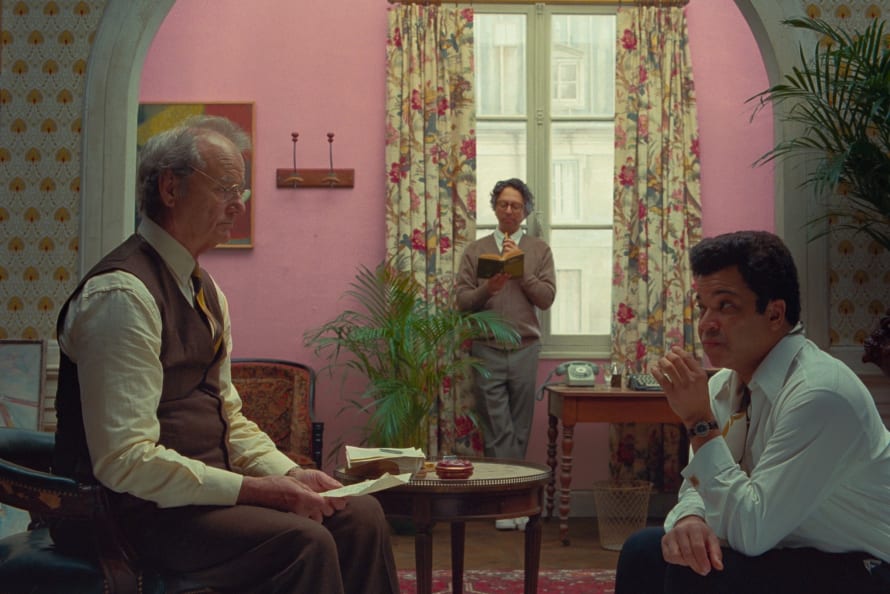Ten films into his career, the trademarks of Wes Anderson's latest, The French Dispatch, will be of no surprise to anyone familiar with the catalogue. We've become so used to his twee stylings and Futura-laden (or sometimes Futura-adjacent) title cards, among other identifiers of the filmmaker's hand, that the "Anderson film" has become a genre unto itself. What is surprising, however, is how the director manages to continue to deliver fresh offerings all these decades later, never running out of eclectic visual cues or ironic-tragic dialogue — and Dispatch doesn't disappoint.
Dizzying and hyper-coherent, the latest entry in Anderson's repertoire, another body saturated with hallmark Anderson-isms, includes a requisite fussy visual palette, one that blends the best of both the violently cheery The Grand Budapest Hotel and the drab, oppressive monochrome of Isle of Dogs. Fleshed out by an enormous cast of regulars, including Tilda Swinton, Bill Murray, Adrien Brody, Owen Wilson, Edward Norton, Willem Dafoe, et al., as well as a roster of promising newcomers (Timothée Chalamet, Benicio del Toro, Léa Seydoux, etc.), the ode to Anderson's love of The New Yorker (sure, why not?) takes the form of a series of vignettes — charming features narrated by eccentric expatriate journalists operating out of the fictional French city of Ennui-sur-Blasé via an American magazine, the titular French Dispatch of the Liberty, Kansas Evening Sun.
Delivered in three or four-ish main overlapping episodic chapters — tied together by the unusually understated Anderson heavyweight Murray as the magazine's editor, Arthur Howitzer Jr., who is based loosely on real-life New Yorker editor Harold Ross — the film captures Ennui as a bizarre collage, a pre-internet curation of fictional culture, art, crime, cuisine and romance.
Plodded out one article at a time, each chapter could easily work as its own feature-length narrative, which makes the segments of the film advance at such rapid-fire pace, the audience is sure to miss numerous French-translated subtitles, entire halves of split-screen action, as we skip over flat-lay cinematography items that certainly could contain a multitude of Andersonian easter eggs. It's intentionally and frustratingly fast, as though fuelled by espresso and teeming with elite journalistic anxiety. In a sense, the film lends itself to multiple rewatches (as do many of the auteur's oeuvre), though some viewers may be disoriented by the brevity offered to each arc in the film's two-hour runtime. (We're holding out for the internet-mythologized five-hour cut.)
That said, the Dispatch is a veritable feast of cinematography, a delicious cacophony of mercurial peculiarities, all anchored thematically by Murray's expertly embodied Howitzer, allowing Anderson to commit to seemingly dozens of montages that fluctuate in and out of greyscale, symmetry and focus. Considering the feat of editing involved in reducing the film to its more digestible, less bladder-busting length, Dispatch is a testament to Anderson-via-Howitzer's own catchphrase: "Try to make it sound like you wrote it that way on purpose." All in all, it might even be the most Wes Anderson film he's ever made.
(Searchlight Pictures)Dizzying and hyper-coherent, the latest entry in Anderson's repertoire, another body saturated with hallmark Anderson-isms, includes a requisite fussy visual palette, one that blends the best of both the violently cheery The Grand Budapest Hotel and the drab, oppressive monochrome of Isle of Dogs. Fleshed out by an enormous cast of regulars, including Tilda Swinton, Bill Murray, Adrien Brody, Owen Wilson, Edward Norton, Willem Dafoe, et al., as well as a roster of promising newcomers (Timothée Chalamet, Benicio del Toro, Léa Seydoux, etc.), the ode to Anderson's love of The New Yorker (sure, why not?) takes the form of a series of vignettes — charming features narrated by eccentric expatriate journalists operating out of the fictional French city of Ennui-sur-Blasé via an American magazine, the titular French Dispatch of the Liberty, Kansas Evening Sun.
Delivered in three or four-ish main overlapping episodic chapters — tied together by the unusually understated Anderson heavyweight Murray as the magazine's editor, Arthur Howitzer Jr., who is based loosely on real-life New Yorker editor Harold Ross — the film captures Ennui as a bizarre collage, a pre-internet curation of fictional culture, art, crime, cuisine and romance.
Plodded out one article at a time, each chapter could easily work as its own feature-length narrative, which makes the segments of the film advance at such rapid-fire pace, the audience is sure to miss numerous French-translated subtitles, entire halves of split-screen action, as we skip over flat-lay cinematography items that certainly could contain a multitude of Andersonian easter eggs. It's intentionally and frustratingly fast, as though fuelled by espresso and teeming with elite journalistic anxiety. In a sense, the film lends itself to multiple rewatches (as do many of the auteur's oeuvre), though some viewers may be disoriented by the brevity offered to each arc in the film's two-hour runtime. (We're holding out for the internet-mythologized five-hour cut.)
That said, the Dispatch is a veritable feast of cinematography, a delicious cacophony of mercurial peculiarities, all anchored thematically by Murray's expertly embodied Howitzer, allowing Anderson to commit to seemingly dozens of montages that fluctuate in and out of greyscale, symmetry and focus. Considering the feat of editing involved in reducing the film to its more digestible, less bladder-busting length, Dispatch is a testament to Anderson-via-Howitzer's own catchphrase: "Try to make it sound like you wrote it that way on purpose." All in all, it might even be the most Wes Anderson film he's ever made.
